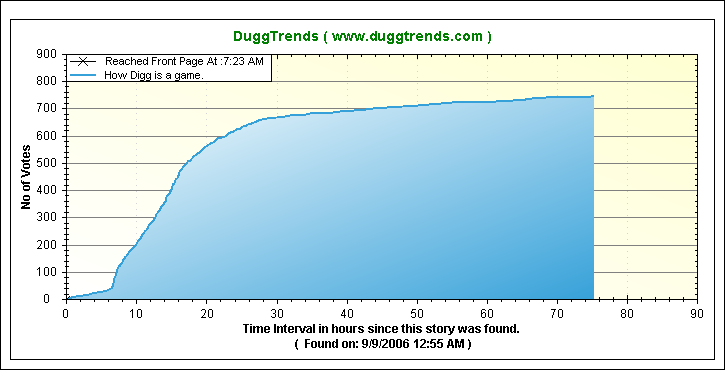Update: This article was dugg and made it to the Digg front page. The traffic came and I discuss the aftermath here. Go here For a Primer of Majority Rule in Social Networks.
Below is the voting chart for that story:

Inspired by Greg’s insightful post, I thought I’d take a minute (or more) on explaining how Digg is a game.
Elements of a Game
In Game Theory, we care about the elements that arise from interactive decisions. Below are the main elements of a game:
- Players – who is interacting?
- Strategies – what are their options?
- Payoffs – what are their incentives?
- Information – how do they know?
- Rationality – how do they think?
In digg, players are the voters; the voters have n options; and, where non-paid voters are concerned, reputation is the over-riding incentive for voting a story (top-digger status, etc.); information come in the form of following the vast web of links of blogs on the web. Rationality — this assumes that the voters are rational & that each voter knows that each voter is rational and that each player knows that each player knows that each player knows that….ad infinitum.
How does Digg work?
I’ll use Philipp’s concise summary of how digg works:
The Digg system of measuring a story’s importance is based on a semi-random set of people voting for or against a semi-random set of news stories.
The Urn Game
In graduate school, I played a really fun and revealing game called “The Urn Game.” The game shows very simply how the concepts of GroupThink, Conformity, Paradigm Shift, and Information Cascades work. Here are the rules of the game:
There are two indistinguishable urns. Urn “W” has two white balls, one yellow. Urn “Y” has two yellow balls, one white. A proctor will flip a coin to choose an urn. You must guess which urn it is after seeing one ball from the urn AND AFTER HEARING ALL THE GUESSES OF THOSE BEFORE YOU. Your goal is to choose wisely.
In our version of the game, 8 students were called per round (new urn-draw each round). At each turn, draw out a ball without looking at any others and without showing the ball to anyone else. Return the ball to the urn, write your guess on the provided sheet, then give the sheet to the proctor.
Playing this game reveals a few things that are relevant to digg and to all social software:
- GroupThink: This game illustrates how conformity can be rational for individuals, even when they don’t care what others do. The decisions made by others convey some information — that is, rational individuals may ignore their own information.
- Conformity: People in a group often believe and do the same thing as people around them. This leads to an Information Cascade — that is, you do what other people do…etc…For example, if you are eating at a fancy restaurant and don’t know which fork to use, you naturally look to see which fork the first person used, and you use the same one. Then, the third person notices which fork you and the first person used, and he does the same. And so on.
- Paradigm Shift: If wholesale conformity occurs, then voters decisions convey no information — that is, if the first 2 people vote for x and everyone follows the first 2 people regardless of their true feelings about the thing voted for, then 100 votes conveys no more information than the first 2 votes. We can further conclude that even when individuals are rational, the group may not be — that is, a few irrational individuals can swing the behavior of an entire group. These irrational individuals are phenomenally first movers also. In the case of Digg, these are the power users — these users commit to a strategy and are known as top diggers.
Digg is not a Prisoner’s Dilemma
In response to Alex Bosworth’s thoughtful post, Digg is not a Prisoner’s Dilemma. Some applications of Game Theory work, and some don’t for certain situations. For example, Nash Equilibrium is not the right concept for some strategic situations.

The Prisoner’s Dilemma is about 2 players, not N players. The two key features of the Prisoner’s Dilemma are (1) both players have a dominant (and rational) strategy to confess AND (2) both players are better off if they don’t both confess. The Prisoner’s Dilemma is the wrong metaphor for Digg.
A Proposed Way of Thinking about Digg
Digg is the online version of The Urn Game. What I see are power users, typically the first movers, wherein a vote is casted by one of the top diggers, and then a flood of comformity follows — that is, voters follow the first movers, typically the power users, and ignore their own rational feelings about the article being dugg and vote anyway, following the power user’s vote. At a wholesale level, this creates an information cascade, such that the Nth vote conveys no more information than the first 2 votes. Philipp is right in his analysis on Groupthink — but, it’s more than that: Digg is a system that allows the power users to swing the behavior of an entire group.
Others Chime In
Here’s Kevin Rose’s solution to the Digg problem:
What is changing however is how we are handling story promotion. While we don’t disclose exactly how story promotion works (to prevent gaming the system), I can say that a key update is coming soon. This algorithm update will look at the unique digging diversity of the individuals digging the story. Users that follow a gaming pattern will have less promotion weight. This doesn’t mean that the story won’t be promoted, it just means that a more diverse pool of individuals will be need to deem the story homepage-worthy.
I’m not sure what he means. But, arrington apparently gets it (or pretends to). I think what Kevin is saying is that Digg will weigh votes, based on the unique user’s historical profile and voting data. Still, it’s vague and I’m not sure what he’s talking about. But, it sounds interesting.
Arrington suggested the following:
I think this is the right thing to do. Digg needs to continue to encourage people to recommend stories to their friends, but also find ways to get truly unique and interesting stories to the home page without the sponsorship of a Digg user group. Hopefully the algorithm changes will help. Another suggestion to improve things that I recently passed on to Digg CEO Jay Adelson: weigh a story digg more if it comes from perusing the upcoming stories area v. someone hitting the story via a direct link. Since friends often email or IM stories around via the direct link, it’s more likely to be a vote from a group. A digg from the upcoming stories page is much more likely to simply be a user reviewing stories and picking the ones that he or she thinks are important.
Arrington’s suggetion is truly lame — to weigh a vote coming from a previously dugg article completely supports the concept of Information Cascade.
Calacanis, of course, has to chime in:
Calacanis — I like you, I really do — you’re level-headed and you go against the tide, but you’re wrong on this one. Digg and most social software smooth over time, and can eventually be approximated by a poisson distribution. This distribution is what Pareto is built on; this means that social software — Digg, ‘Scape, and all of them are not Democratic — they are Republics. A truly democratic society would mean that all votes are equally weighed — a majority rule –, but that’s not the case with first-movers and top-diggers.
My Proposal
If Digg were to be relevant again, it must tackle the problems of GroupThink, Conformity, Paradigm Shift and Information Cascades.
- To tackle Groupthink, make it truly democratic again — do not profile Top Diggers or elevate anybody higher than anyone else. This includes no special weights on previous digging history, etc. — level playing ground for everyone, no monarchies or philosopher-kings.
- To tackle the problem of conformity, do not show profile or # of votes for up-and-coming dugg articles. Just show the article link, with no profiles or votes attached to it. As a compromise, only show the profiles and votes on the articles that make the digg front page, but make them un-diggable from the front page.
Doing the above 2 items will most likely fix the Paradigm Shift and Information Cascade problem.
What’s Left of Digg if Kevin Rose follows my advice?
If Kevin Rose follows my advice, Digg will become a user-generated meme, truly democratic, where the votes are equally weighed and blind to any first-mover, power-user, and irrational individuals that may sway the behavior of the group. The quality of the front page articles will be higher for sure. The social aspect of Digg will be compromised, but it will be relevant again.
+++++
Below are other who have joined the soap opera:
- NicK Carr, hardly an academic post, but quasi-interesting
- Good Stuff from MIT here.
- On how Digg follows the Pareto Principle in its voting behavior
- J. LeRoy on gaming the system
- A history on the Digg controversy
- More on Digg
- Pirillo weighs in
- An excellent article by Clay Shirky
- More from CNET here and here.








Interesting post, Pete.
I’m not sure I agree with it though. In the post, you are arguing that the main problem is an information cascade where people vote based on how other people are voting.
I think the main problem is collusion. People vote together because of an externality to the game. People vote together out of self-interest to get valuable traffic to their content.
In an information cascade, the issue is mostly that information is costly — it takes too much time to read the article — so people look at other people (who they hope got the information) and follow their behavior. In collusion, the issue is that players are making side payments in the game to get favorable outcomes.
Depending on which is correct, you get different solutions. As you suggest in your post, an information cascade could be prevented by making it easier to get information or by denying information about how other people act. Collusion requires detecting and punishing behaviors that look like collusion (e.g. dropping link farms from a web search index) or reducing the benefit people could get if they cheat.
@Greg,
Thanks for your comments.
“I think the main problem is collusion. People vote together because of an externality to the game. People vote together out of self-interest to get valuable traffic to their content.”
I don’t agree. I don’t see the payoff for collusion — put another way, what incentives do people have for colluding? Remember, these are semi-random users voting on semi-random articles (unique URL’s) — how do you collude in an environment where there is a quasi-element of randomness? Now, if the top Digg users colluded — then I think you’re point is very sound and valid. But, I’m assuming that the top Digg users are rational and independent, but the rest of the population behave irrationally. Am I missing something?
And, whether the traffic coming from Digg is valuable, I think that’s debatable.
Wow, this was a great write-up! First off, I want to say that I don’t know much about the Digg community except for what I’ve observed whenever I visit that site (in other words, I’m not an active member of it). But I think I agree with Greg’s take. I think there is definitely the intent to collude and push certain articles to the forefront, and I think there is definitely a measurable gain to be had by doing so. The whole thing becomes nothing more than a popularity contest, with the more popular Digg users promoting their own agenda (that might be too strong a word) instead of promoting truly interesting or worthy content.
Ah, right, I think we disagree on the model for Digg.
I don’t think these are semi-random users voting on semi-random articles. I think groups of users get together and vote on specific articles on Digg.
For one of many examples, some weblogs ask all their readers to Digg every article they publish. They are asking a specific group of readers to promote specific content on Digg.
The voting is not semi-random users voting on semi-random articles. Instead, people can manipulate Digg for their own interests, promoting their own content and driving traffic to themselves.
A possible solution to the problem of collusion on Digg would be to try to ensure that Digg always has semi-random users voting on semi-random articles. But, right now, it does not.
Very nice piece..
I took a slightly different look at the problems facing the digg model and came to a different conclusion – that even without the groupthing behavior, the basic notion of using crowds to filter+vote on story value is flawed. i proposed instead a kind of hierarchy of experts as publicly known elected representatives, and letting crowds do what they do best, DISCOVER stories, rather than vote on them:
http://www.donationcoder.com/Forums/bb/index.php?topic=5160
I wonder how one can apply altruistic punishment or wary coopeartor model, as opposed to Rational Choice.
I thought this post was great. Digg really does need to do something and do it fast. But I’m not sure it wouldn’t stop people from digging their friend’s posts regardless if they see the count because they can track them all down.
This is such an ecxellently written article — incredible informative and intelligent. If more bloggers wrote you you do, the web would be more relevant for the rest of us.
Great article. I strongly agree on your analysis on how Digg works, but I think
Greg’s right about what the problem is today. Today the problem is collusion. If
I had a blog that I want to make money from – say – AdSense, I would like to
have all my articles on the Digg’s frontpage, for that will bring in a freaking
lot of people, and people are clicks, and clicks are money. So if the top 10
diggers can make it happen, they’re friends of mine, I’m ok.
Speaking about your solution:
“To tackle Groupthink, make it truly democratic again ” do not profile Top
Diggers or elevate anybody higher than anyone else. This includes no special
weights on previous digging history, etc. ” level playing ground for
everyone, no monarchies or philosopher-kings.”
That’s a nice point but does not make any sense business wise, for power users
status is a major barrier to similar sites competition. That applies to Digg
and to almost all other “social” application out there. If you’re a good
“editor”, I gotta give something to you to stay, otherwise you may as well go
to Reddit or any other site. In my opinion that’s like selecting and giving a
prize to the people you want to keep. Of course, the criteria you use to select
may be the right ones or the wrong ones, but that totally another story.
p.s.: Txs for solving the math issue! 🙂
@Greg,
Yeah, collusion, that makes sense. Suppose we invoke the concept of “Social Convention” — current examples of this are tipping at restaurants: it’s not mandatory, but it’s awfully cheap and sleazy if you do not. But, the truth is, it is Social Convention — it’s not mandatory at all. In fact, the linguistic etymology of the word “Gratuity” is “Gratis” — which means free. Economics imposes upon us Social Conventions that, by not doing, brings shame upon us.
What if we had a Social Convention, such that made collusions shameful. For example, sending an email to your friends and asking them to Digg your post — what if that were viewed as shameful — a public sort of shame — that might prevent collusions — something that would bring public shame to the person asking to be dugg.
Who knows. I think there ought to be Social Conventions for blogging — ones that prevent collusions.
This is the most interesting blog post I’ve read in a seriously long time. Great job. Most blogs just regurgitate bullshit from the list-A bloggers. This content is good, original, and your arguments are right on. Of the many “great unread blogs”, this definitely isn’t one.
Really good article, Pete. Well worth the Digg homepage.
Giving a value to a vote that depends from many factors is one of the way to avoid large scale manipulation in social news website. Together with coauthors we worked on this topic, more information can be found in three posts whose first is :
http://www.spoonylife.org/social-networks/problems-of-social-news-websites